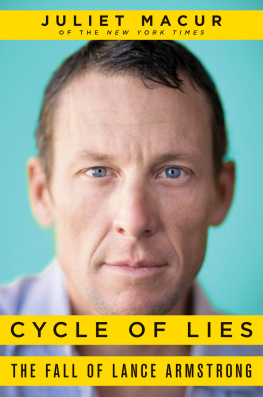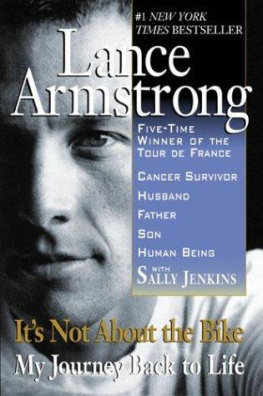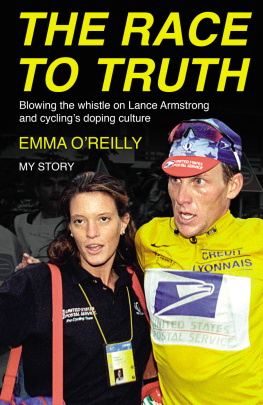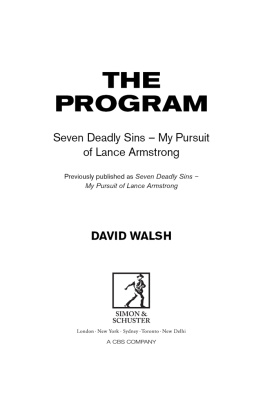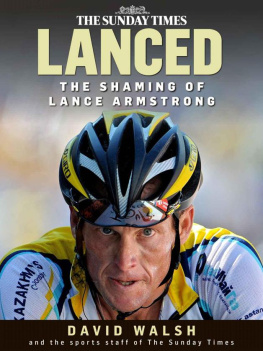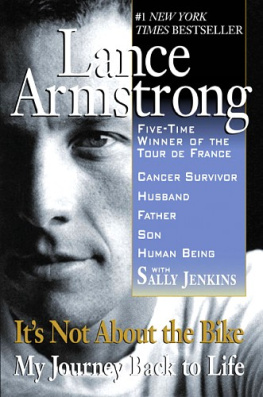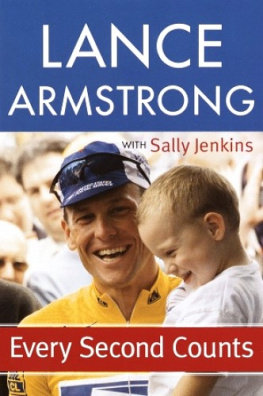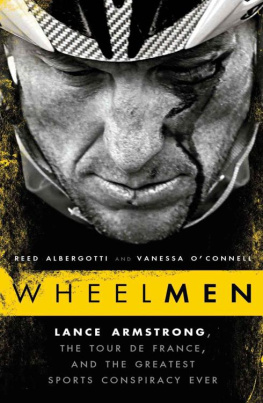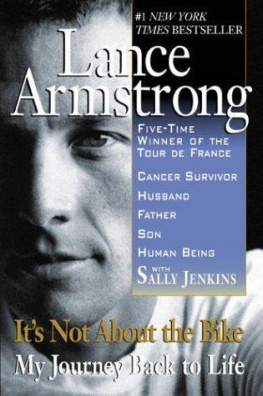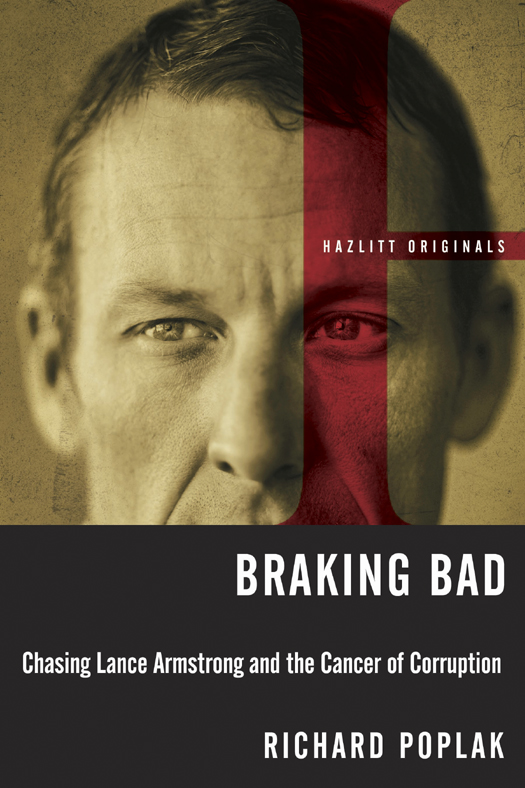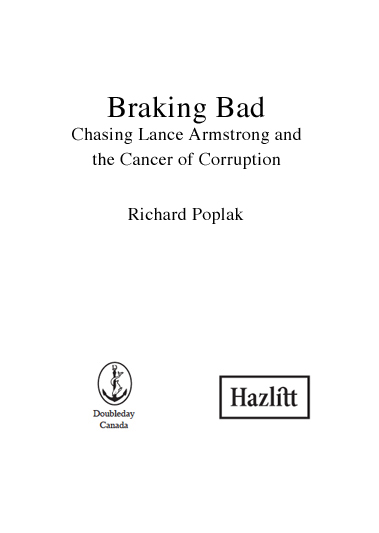Hazlitt Originals
A new series of original, commissioned e-books of varying length and subject matter, featuring both established and emerging authors from around the world. From investigative journalism and fiction, to travelogues, polemics, and interactive tablet creations, Hazlitt Originals aspire to push the boundaries of story form.
Titles in the series
Braking Bad: Chasing Lance Armstrong and the Cancer of Corruption, by Richard Poplak
The Gift of Ford: How Torontos Unlikeliest Man Became its Most Notorious Mayor, by Ivor Tossell
You Arent What You Eat: Fed Up with Gastroculture, by Steven Poole
The Man Who Went to War: A Reporters Memoir from Libya and the Arab Uprising, by Patrick Graham
Copyright 2013 Richard Poplak
All rights reserved. The use of any part of this publication, reproduced, transmitted in any form or by any means electronic, mechanical, photocopying, recording or otherwise, or stored in a retrieval system without the prior written consent of the publisheror in the case of photocopying or other reprographic copying, license from the Canadian Copyright Licensing Agencyis an infringement of the copyright law.
Doubleday Canada and colophon are registered trademarks of Random House of Canada Limited
Library and Archives of Canada Cataloguing in Publication is available upon request
eISBN: 978-0-385-68082-0
Cover design: CS Richardson
Cover photo: Joel Salcido/Aurora Photos/Corbis
Published in Canada by Doubleday Canada, a division of Random House of Canada Limited
www.randomhouse.ca
v3.1
Contents
Indlala inamanyala (Dont blame us, blame our stomachs).
Zulu saying, during the xenophobic violence, South Africa, 2008
Did you ever see a government pray?
John Garang, South Sudan liberation hero, 2003
That all you fuckers got? You gonna let Cancer Boy kick your ass?
Lance Armstrong, during a US Postal training ride, 1998
Authors Note
This essay is not a definitive account of the Lance Armstrong era; it does not divulge any new information on his many years as a cyclist and doping conspirator. For that, we have the Reasoned Decision of the United States Anti-Doping Agency on Disqualification and Ineligibility, a document that pronounces on Armstrongs record with remarkable force and detail.
Rather, this is an attempt to reconcile my years as an international journalist and an amateur cyclist. As such, it is an extended meditation on that most human of foibles: corruption.
During a 2009 Tour of California press conference, several years before his highly publicized confession, Armstrong was defending the record of the disgraced cyclist Floyd Landis and asked, As a society, are we supposed to forgive and forget and let people get back to their job? As far as Im concerned, the question is meaningless. As a society, the best we can hope for instead is to chart and expose the corruption committed by our heroes, leaders and institutions with the expectation that such knowledge will help us to become better and saferand perhaps happier.
Prologue
Invisible Man
Juba, the worlds newest capital in the worlds newest country, on the morning of November 9, 2012Barack Obama is once again president of the United States, and numberless South Sudanese citizens have already uploaded his victory speech as a ringtone: You reaffirmed the spirit that has triumphed over war and depression, the spirit that has lifted this country from the depths of despair to the great heights of hope.
Im lying in a retrofitted shipping container on the banks of the Blue Nile, the air conditioning making me feel like so much refrigerated produce, when Twitter delivers an item of news unrelated to the US election resultsnews I suppose I had been expecting. A South African cyclist named David George, who rode with Lance Armstrongs US Postal Service team in 1999, has tested positive for the use of the blood-boosting drug erythropoietin.
George, once a minnow in the Armstrong Inc. shark tank, was now another of cyclings discards. Id first interviewed him in December of 2011, at a Cape Town shopping compound that represents the opposite of the South Sudanese experience. Constantia Village mall is the headquarters of South Africas mink-and-manure belt, and there sat George, a Constantia boy born and bred, working his way through breakfast. Up until then he had endured a difficult career, largely because hes a difficult man, an impossible man, a mess of tics and irritable bowel syndrome symptoms that had wrung every last shred of humanity from his person. He forced down his meal, the tendons in his neck vibrating like cello strings. There was no one to look out for me, he said, battling his toast. The whole timein Europe, on Postal Service, whereverthere was no one to look out for me. No one.
In retrospect, I cant help but interpret the interview as a pre-confession, as a means of explaining the motives behind a personal doping regimen that lasted for more than fifteen years. So I part the mosquito net and get out of bed, contemplating this latest development. If there was a signal event that defined Georges outlook, Im thinking, it mustve been what happened to his homeboy, Ryan Cox. A 28-year-old pro on the rise, Cox was garrulous, affable, fast. In 2007, racing for Team Barloworld, he underwent surgery to repair a damaged external iliac artery. Pressured to resume cycling as soon as possible, Cox didnt recuperate properlythree weeks after the operation, he died from internal bleeding and organ failure. For David George, apportioning blame was simple: the unconquerable granite edifice of professional road cycling, guilty as charged. His death epitomized the brutality of it, he spat. The shit I had seen at US Postal. The shit Id seen everywhere. All of it. They killed him. They fucking killed him.
I pop open my computer, scrolling through the sound file of that interview, thankful that for $125 a night the container at least comes furnished with a wooden desk. For the past week, along with South African journalist Kevin Bloomchildhood friend, soul brother, co-writer of a book in progress covering the rise of the New AfricaIve been trooping around Juba, encountering the grand sweep of South Sudanese society. Liberation hero John Garangs nephew had talked us through the vision statement that would form the basis of the countrys constitution. A glorious piece of prose, soaringwe were watching a nation take shape before our eyes.
The Manifesto for South Sudanese Development, which opens with the words This is a new beginning, is the final switchback on the long climb to nationhood. For five hundred years, southern Sudan has been the butt of a cruel African jokean emporium for Arab and European slavers; colonialisms forgotten corner; a battleground for semi-constant civil war since independence in the mid-1950s; a graveyard for millions. In 2005, the Sudan Peoples Liberation Army/Movement, or SPLA/M, led by John Garang, signed the Comprehensive Peace Agreement with Omar al-Bashirs northern government in Khartoum, a document intended as a road map for succession. On July 9, 2011, following a referendum that was all but unanimous, South Sudan was added to drop-down menus everywhere and became Africas fifty-fourth state. After five centuries of violence and neglectfreedom. Or, as Barack Obama once famously advertised, in a refrain picked up and tub-thumped by the locals:


